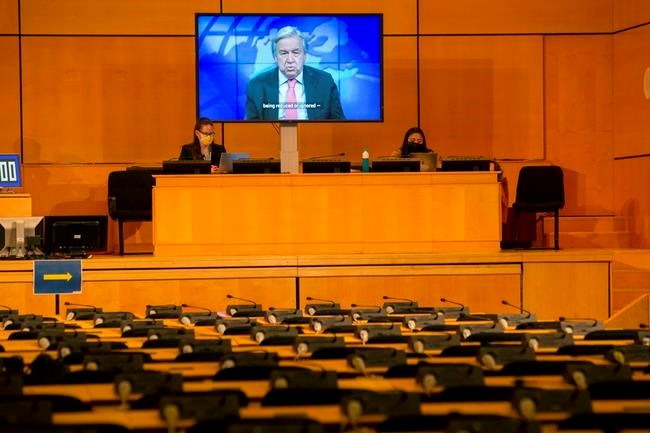GENEVA — The U.N.’s top human rights body has opened its first and highest-level meeting of 2021, amid growing concerns on issues including the military coup in Myanmar, the arrest of Russian opposition leader Alexei Navalny and the rights situations in countries including Ethiopia and Sri Lanka.
The four-week session at the Human Rights Council starting Monday drew several presidents and prime ministers for its “high-level segment." Venezuelan President Nicolas Maduro spoke out against “economic aggression” by critics who sanctioned his country over his government's violent crackdown on dissent.
Some Western powers voiced a laundry list of rights concerns. British Foreign Secretary Dominic Raab cited a “dire and shocking situation” in Russia and said it was “disgraceful” that Navalny, a vocal critic of President Vladimir Putin, had been sentenced on “arbitrary charges” after being poisoned last year.
German Foreign Minister Heiko Maas spoke out on China, citing “arbitrary detention of ethnic minorities” like Muslim Uighurs in the Xinjiang region and “China’s crackdown on civil liberties in Hong Kong.”
His Chinese counterpart, Wang Yi, echoed his government's frequent critique of foreign meddling in China's “internal affairs” and defended Beijing's policies in Hong Kong — where he claimed public support for a widely criticized security law — and Xinjiang.
“There has never been so-called genocide, forced
“Human rights are not a monopoly by a small number of countries,” he said. Wang also reiterated China's invitation to the U.N. human rights chief, Michelle Bachelet, to visit Xinjiang.
Aside from such hot-button issues, the session is expected to tackle a global array of human rights concerns like post-election repression in Belarus, a squeeze by Ethiopia’s government on the country’s Tigray region, and state-sponsored violence in countries including Nicaragua.
“Every corner of the globe is suffering from the sickness of violations of human rights,” said U.N. Secretary-General Antonio Guterres.
The military coup and violent crackdown on protesters in Myanmar since early February was among the most pressing issues on the council's agenda.
“Today, I call on the Myanmar military to stop the repression immediately," Guterres said. "Release the prisoners. End the violence. Respect human rights and the will of the people expressed in recent elections. Coups have no place in our modern world
The session, almost exclusively online, comes as the fight against COVID-19 has become a pretext by some governments to curb human rights, and worsened gender inequality and extreme poverty — even as vaccination efforts have largely been carried out in the world’s richest countries.
Guterres also decried racism, discrimination, xenophobia and the “transnational threat” of white supremacy and neo-Nazi movements — saying such groups are “engaged in a feeding frenzy of hate.”
“Far too often, these hate groups are cheered on by people in positions of responsibility in ways that were considered unimaginable not long ago,” he added, without elaborating.
The United States is set to resume participation at the council after a 2-1/2 year walkout by the administration of former President Donald Trump, which accused it of an excessive focus on Israel and acceptance of autocratic regimes that regularly violate human rights — citing Venezuela in particular.
Sen. Rick Scott of Florida, a fellow Republican of Trump’s, criticized Maduro's participation Monday and thundered in a statement that the 47-member-state body “should have the words ‘human rights’ stripped from its title, and explain its decision to the millions of Venezuelans suffering under Maduro’s regime.”
The Biden administration, leading a U.S. return to international institutions like the rights council that were shunned by Trump, was set to take part in the high-level segment on Wednesday with a speech from Secretary of State Antony Blinken.
Jamey Keaten, The Associated Press



